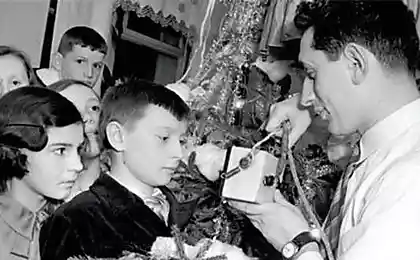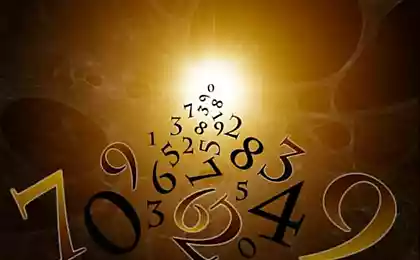1199
As the New Year different peoples of the world

New year in Australia begins the first of January. But just at this time there is so hot that Santa Claus and Snow Maiden spread the gifts in bathing suits.
Italians in the New Year's Eve thrown out of the windows of the old things - are flying out of the windows into the street flower pots, old chairs, boots ... The more throw things, they say, the more wealth will bring the New Year.
The inhabitants of the British Isles with two hands holding on to the old custom of "Adm New Year» (Letting in New Year): When the clock starts to hit 12, opened the back door of the house to release the old year, and with the last kick of hours open the front door, letting in the New Year.
In Scotland, before midnight on farms breed bright fire in the fireplace and the whole family sits around waiting for hours of battle. When the clock approaching 12, the owner of the house gets up and opens the door silently. He keeps it open as long as until the clock strikes the final blow. So he lets the old year and new admits.
In Spain, the New Year girls and boys throughout the village draw lots - pieces of paper with the names of the villagers of both sexes. Men thus receive "brides", girls - "suitors". In some places, this procedure is done in front of bonfires at the church porch. Formed married couples considered until the end of the Christmas holidays lovers and and behave appropriately.
In Barcelona, in Madrid recently in New Year's Eve tickets sold with the names of the guests of both sexes, and then joined them in pairs at random: get the "grooms" and "bride" for the evening. The next morning, "the groom" had to come to his "bride" with a visit and a gift - flowers, chocolates. Sometimes, young people adjust to the matter so as to obtain in the "bride," his girlfriend, and the case ended this marriage. It is very likely that there - traces of ancient, very serious marriage custom, when marriages were strictly controlled by the community.
In Belgium and the Netherlands pervasive "the magic of the first day," the meaning of which is that of human behavior on the first day of the New Year is judged that he will in the coming year. Therefore, we try not to hold that day, put on something new, and so on. D. For the whole year was prosperity in the house, and had an abundance of food in the New Year.
Since ancient times there in the Netherlands and Belgium, another widely used in other countries, the custom - the election of the King holiday. To this end, women bake a cake, which is baked bean. Anyone who gets a piece of cake with bean becomes king for the whole holiday. The King himself chooses his queen and retinue: court jester, nobleman, "Black Peter" and others.
In Austria, the modern custom of gifts and greetings for the New Year has been circulated in the late XVIII and early XIX century. Now accepted to give figures or send postcards to the traditional symbols of happiness; those considered to be a chimney sweep, four-leaf clover, a pig. Dinner on December 31 to be abundant in the new year to live well. The obligatory meat dish was jellied pig or pork. We believe that in order to be happy, you have to eat a piece of pig's head or snout; it was called "to participate in the swine happiness» (Saugluck teilhaftig werden).
In Switzerland, (and in the above-mentioned Austrian) people dress up to celebrate the day of St. Sylvester. This holiday is based on the legend that Pope Sylvester (314 year) caught a terrible sea monster. It was believed that in 1000, the year this monster will break free and destroy the world. To everyone's joy did not. Since then, Austria and Switzerland recalled the story in the New Year. People dress up in costumes and called themselves Silvestrklausami.
New Year's in Hungary is as important as Christmas, although some Christmas rituals and beliefs respected, and at this time. It is, for example, have been distributed to believe, related to the magic of the first day, among them the important role played superstitions related to the first visitor. According to popular believe a woman included in this first day in the house, brings bad luck. So often in the house of relatives under some pretext sent the boy after visiting the house which is not terrible and the visit of the women. A lot of magical action is taken to ensure that in the new year to be healthy and wealthy. So, in other areas, washing up in the morning, instead of soap rubbed his hands coins so that they are not transferred to the hands of the entire year.
In Yugoslavia, the New Year many wondered: salted for 12 slices of onion determined the weather in any given month. In some areas of Slovenia on the table laid out ten different subjects: among them were the pine sprig (happiness), the ring (wedding), Doll (increase family) money (wealth), and so on. E., That covers a fur cap. Every reptile had three pull an object, and if all the time he caught one and the same, it meant that within a year of his life an event occurs associated with the symbolism of the subject.
Muslims use a lunar calendar, so the date of the New Year for Muslims every year moves forward by 11 days. Iran (Islamic country, formerly known as Persia) New Year was celebrated on March 21. In just a few weeks before the New Year, people put grains of wheat or barley in a small dish. By the New Year the grain germinate, which symbolizes the beginning of spring and the new year of life.
Hindus, depending on the place of residence to celebrate New Year in different ways. Residents of northern India adorn themselves with flowers of pink, red, purple, or white shades. In southern India, his mother placed sweets, flowers, small gifts on a special tray. On the morning of the new year, children have with their eyes closed to wait until they were let down to the tray. In central India on buildings hang orange flags. In western India, New Year is celebrated in late October. On the roofs of the houses are lit small lights. In the New Year Hindus think of the goddess of wealth, Lakshmi.
New Year in Burma begins the first of April, in the hottest days. The whole week people from the soul poured water on each other. There is a Christmas festival of water - Thingyan.
In October, the New Year comes to Indonesia. All dressed up and people asked each other's forgiveness for the trouble they have caused in the past year.
The Jewish New Year is called Rosh Hashanah. This is - a holy time when people think of the sins committed, and promise to redeem them in the next year in good works. Babies give new clothes. People bake bread and eat fruits.
In Vietnam, the New Year is called "Tet". He met between January 21 and 19 February. The exact date of the holiday varies from year to year. The Vietnamese believe that each house lives a god, and the god of the New Year, this goes to heaven, there to tell you how spent passing year, each member of the family. Once the Vietnamese believed that God floats on the back of carp. In our time, the Vietnamese New Year sometimes buy a live carp, and then release it into the river or pond. They also believed that the first person to come into their home in the New Year will bring success or failure in the coming year.
In Japan, New Year is celebrated on January 1st. In order not to let the evil spirits, the Japanese hang bundles of straw in front of the house, which they believe brings happiness. At the beginning of the new year, Japanese people start laughing. They believe that laughter will bring them good luck in the coming year.
Chinese New Year is celebrated between January 17 and 19 February, during a new moon. Street procession - the most exciting part of the holiday. Thousands of lanterns are lit during the process, to light the way in the New Year. The Chinese believe that the new year surrounded by evil spirits. Therefore, they scare them crackers and firecrackers. Sometimes the Chinese windows and doors sealed with paper to keep out evil spirits.
In Greece, New Year - is the day of St. Basil. St. Basil was known for his kindness, and Greek children leave their shoes by the fireplace in the hope that Saint Basil will fill the shoes gifts.























